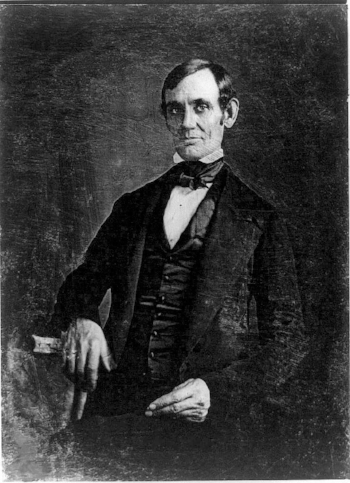The "Gettysburg Portrait", A head-on photograph of Abraham Lincoln taken on November 8, 1863; two weeks before his Gettysburg Address. By Alexander Gardner (image cropped)
Unlike some influential figures of his time, Abraham Lincoln did not grow up as a child of privilege. Born in a one-room log cabin to humble parents, he completed backbreaking work alongside his father to scrape out a family living.
Lincoln could wield an axe and clear land like no other, but he didn’t enjoy the hard labor of country life. Determined to free himself of his “country bumpkin” upbringing, he set his eye on more prosperous, risky pursuits.
His ambition got him into a big financial jam early on, but the real story is what Lincoln did to get out of it.
Lincoln’s Debt Trap
As young Lincoln took on new business opportunities, he got a taste of what it really felt like to be a man of industry. Having moved to New Salem, Illinois, Lincoln bought out a series of general stores in town. But Lincoln and his business partner didn’t stop there.
Stephen B. Oates, author of With Malice Toward None: A Life of Abraham Lincoln continues:
“Instead of paying their debts, Lincoln and Berry succumbed to the go-for-broke spirit of the age and plunged into other financial and business ventures, assuming mortgages and giving notes they could scarcely meet.”
In time Lincoln’s credits and mismanagement of the stores caught up with him, pulling him deeper into debt until the businesses “winked out.” Lincoln’s luck continued to sour. Legal trouble soon followed and his business partner died, leaving Lincoln responsible for the $1,100 debt, or about $25,000 today. A huge debt for someone of modest means like Lincoln.
“A man of unimpeachable honesty”
How did Lincoln choose to combat his debt crisis? Could he go legally bankrupt and evade the grasp of his creditors? Even fleeing the country to escape one’s debts was not unheard of at this time.
Not “Honest Abe.” Lincoln vowed to pay back every dollar of the money he owed, and he spent the next 15 years doing it. It didn’t involve simply picking up odd jobs and paying his debts piecemeal. Lincoln’s whole financial focus seemed directed towards repayment, and at great sacrifice.
For example, despite his reluctance to live in less than hospitable dwellings, Lincoln and his new bride, Mary Todd, moved into a small, smoke-filled tavern where room and board costed just four dollars a week. Their first child was born there as well.
Daguerreotype of Congressman Abraham Lincoln, taken in 1846 by Nicholas H. Shepherd.
Lessons from Lincoln’s Debt Crisis
No doubt Lincoln was embarrassed of the situation he found himself in, steeped in debt with a family to care for. It’s certainly not the first time a good, honest person has found themselves in a similar situation and it won’t be the last. Thus, it’s worth gleaning some lessons from Lincoln’s experience.
Debt is more than just a prison
There are some who take on debt knowing full well the costs and have a plan to utilize it well. As I’ve said before, debt makes sense in some cases, but for most of us, debt is like a prison. However it’s not a prison where we simply sit around and nothing happens. Instead, debt continues to take and take.
Author and religious leader J. Rueben Clark explained it this way:
“Interest never sleeps nor sickens nor dies; it never goes to the hospital; it works on Sundays and holidays; it never takes a vacation. … Once in debt, interest is your companion every minute of the day and night; you cannot shun it or slip away from it; you cannot dismiss it; it yields neither to entreaties, demands, or orders; and whenever you get in its way or cross its course or fail to meet its demands, it crushes you.”
Drastic measures to eliminate debt may be necessary
When Lincoln’s debt obligations became real and his creditors came after him, he made significant cuts to his lifestyle. This achievement was much harder than it may seem. Lincoln had risen from a backcountry upbringing to economic level of at least some repute, and he wanted to keep it that way. His wife came from a far wealthier upbringing than Lincoln. She certainly didn’t expect to live in a tavern for the first couple years of her marriage.
Lincoln made cuts that he felt were absolutely necessary to get his debts paid. Interestingly, he was also willing to slash his largest expense (and often our largest expense as well): his home expenses. Are you willing to live in the “four-dollar-a-day tavern” to eliminate debt more quickly?
Being men and women of “unimpeachable honesty"
The wonderful thing about this story is the magnificent ending. Lincoln didn’t follow the crowd by fleeing the country (and his creditors). His honor and good name were worth far more than that. Honoring his obligations when others would not made him a man that others knew they could trust--an unimpeachably honest man.
This brought a deep respect for Lincoln and brought him praise and reward far beyond what he may have received otherwise. Business opportunities and political position--ultimately leading to his election as President of the United States--were no doubt influenced by Lincoln honoring his commitments.
I hope reflecting on this experience of young Abraham Lincoln has been helpful to you. We live in a different world than Lincoln. We have debt forgiveness and consolidation programs. Worst comes to worst, “Gino” probably won’t show up at our doorstep to collect a debt with a baseball bat.
How we respect the use of debt and honor our commitments says something about our character, which, as with Lincoln, can pay dividends in the future.


